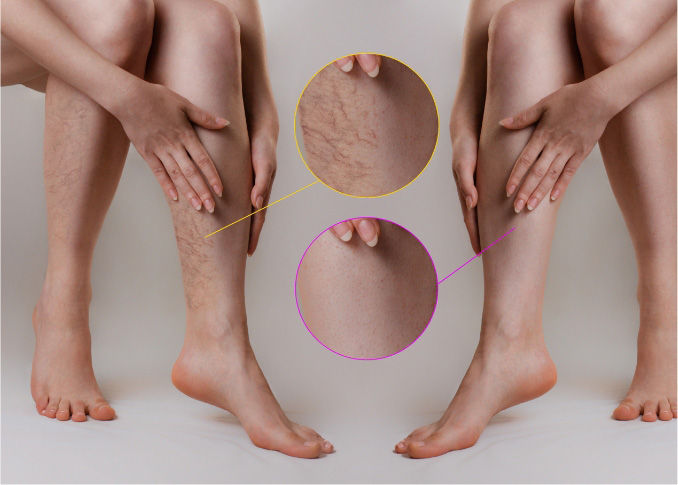Top Long Island Vein Doctors
When to See a Vascular Doctor?
When to see a vascular doctor?
If you’re wondering if you should see a vascular doctor, vascular surgeon, or primary care physician, there’s a strong chance you have the symptoms of vein disease. You must consult vein doctors and vascular surgeons if you notice the signs and symptoms of vein disease, such as spider veins, varicose veins, leg heaviness, and more. Leaving vein disease untreated increases the risk of advanced complications necessitating complex treatments.
Our state-of-the-art spider vein and varicose vein treatment centers specialize in the latest minimally invasive procedures. We always diagnose and treat the root cause of your vein problems, thus ensuring you experience optimal and long-lasting results. You can find our vein treatment clinics in Lindenhurst, Jericho, and Hampton Bays in Long Island. You may schedule an appointment online if you have symptoms of vein disease.
Below, we highlight the situations when you should consult vascular surgeons in LI.
When you have spider veins and varicose veins…
Most patients consult vascular doctors and primary care physicians when they identify spider veins and varicose veins. Spider veins are dense clusters of red blood vessels that look like spider webs just underneath the skin’s surface. Varicose veins are dense and bulging blood vessels that protrude out of the skin’s surface, looking like twisted, tangled, and knotted ropes. Spider veins and varicose veins are essentially dilated blood vessels.
Most people consult vein doctors for spider veins and varicose veins because they lead to self-consciousness and social anxiety. Spider veins and varicose veins look ugly, and they only grow larger and more numerous with time. Over time, you may find yourself wearing oversized clothes and avoiding social events because of social anxiety, which can affect your mental health in the long run.
If you have spider veins and varicose veins, please contact our vein doctors in LI.
When you have the signs and symptoms of vein disease…
Spider veins and varicose veins are the most visible vascular problems, but you may experience numerous other subtle vein problems. You should ideally contact vein doctors when you notice the early signs and symptoms of chronic venous insufficiency, the root cause of most vein problems. If you treat vein disease at the earliest stage, you may even avoid spider veins and varicose veins altogether.
Venous insufficiency is a medical condition wherein your vein valves — usually responsible for ensuring smooth one-way blood circulation to the heart — collapse or malfunction. When your vein valves collapse, gravity forces blood to flow backward and accumulate in the leg veins, leading to vascular dilation, spider veins, and varicose veins.
The earliest warning signs of vein disease are fairly mild and benign, which is why vein disease often goes undiagnosed at the earliest stages. The early warning signs of vein disease include leg heaviness, frequent leg cramps, restless leg syndrome, persistent leg pain, leg swelling, and skin discoloration. These symptoms usually worsen at the end of the day or after long periods of sitting or standing still.
If you notice the initial symptoms of vein disease, please contact your primary care physician or vascular surgeon in Long Island.
When you experience advanced vascular complications…
If you don’t seek vein treatment at the early stages, you may need emergency treatments for the advanced complications of vein disease. Venous insufficiency is a chronic condition, which means it gradually worsens and escalates with time, eventually leading to severe complications.
Over time, the continued accumulation of blood in leg veins would lead to extreme vascular dilation and weaken the walls of varicose veins. Once your varicose veins are over-dilated, the slightest of pressure can lead to burst varicose veins, necessitating a trip to the emergency room.
Besides bleeding varicose veins, advanced vein disease also leads to skin discoloration, rust-colored patches on your skin, non-healing leg wounds (leg ulcers), and deep vein thrombosis. If the blood clots in your leg veins break away, they may travel into the lungs and cause a pulmonary embolism, which can be fatal.
You should ideally consult vein doctors long before you experience the advanced complications of venous insufficiency. However, if you experience these vascular problems, you must seek emergency vein treatments without delay.
What conditions does a vascular doctor treat?
Vascular doctors treat a wide range of vascular conditions related to vein health. Broadly speaking, vein doctors address all the vein conditions caused by chronic venous insufficiency. These include leg heaviness, frequent leg cramps, restless leg syndrome, leg swelling, persistent leg pain, spider veins, varicose veins, skin discoloration, leg ulcers, and deep vein thrombosis. You must contact vascular surgeons or vein doctors if you notice any of these problems.
What happens at the first vascular appointment?
Your first vascular appointment is all about understanding your specific goals, symptoms, and conditions. The vein doctor will review your medical history, examine your leg veins, and ask about your symptoms. You must accurately highlight everything you feel, even if it doesn’t feel related to vascular health. The vein doctor will also ask about your family history. The primary goal during the first vascular appointment is to determine the likelihood of chronic venous insufficiency, the root cause of most vascular problems.

We know health insurance is confusing so we will help you check if you’re covered:
FREE Coverage Checker:
What does a vascular test consist of?
Your vein doctor will schedule an ultrasound diagnostic scan, known as duplex ultrasound, to identify chronic venous insufficiency. During the ultrasound scan, the vein doctor will generate ultrasound energy by moving a handheld device over your legs, which will visualize the blood flow in your leg veins. The direction of blood flow in your leg veins will reveal if you have chronic venous insufficiency, thus allowing the vein doctor to curate a personalized vein treatment plan.

Visit Our Long Island Vein Treatment Center
Long Island
Vein Specialists
Meet your Long Island NY Vein Doctor
With Harvard Trained Medical Directors, our vein clinic Long Island sources only the top spider and varicose vein experts in the country.


Change your life
Join thousands of happy patients just like you
Vein treatments are often covered by major medical insurances, including Medicare. How do you know if your insurance will cover your vein treatment?
Contact us
CALL US
Speak with one of our team members to ask any questions you may have, verify your insurance and book an appointment at your earliest convenience. (631) 629-1118
BOOK APPOINTMENT
You can give us a call at (631) 629-1118 or fill out one of our forms here to request a call back; one of our team members will call you and help you verify your insurance coverage before booking your appointment.
Get directions
Visit us at our Long Island Vein Treatment Center located at 481 West Montauk Highway.